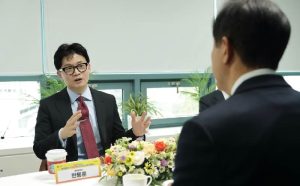On December 26, the national committee of the People Power Party (PPP) confirmed South Korea’s former Justice Minister Han Dong-hoon as its interim leader. Han relinquished his ministerial position earlier and is expected to command the party through the general election in April.
The decision comes at a critical juncture for the ruling PPP. In October, the party boldly appointed a political outsider, physician Ihn Yo-han, as its innovation committee chairman. But to the dismay of many, Ihn’s 42-day-long marathon to reform the party ended prematurely, bearing no fruit. The ruling party has also failed to band together, as the intra-party rupture caused by former PPP chief Lee Jun-seok’s departure deepens.
Amid troubling prospects, President Yoon Suk-yeol and his party are hedging their bets on ex-minister Han to regroup the team heading into a fierce race.
Largely considered Yoon’s right-hand man, Han rose to political prominence by serving on Park Young-soo’s special counsel team between 2016 and 2017. Under the auspices of then-team leader Yoon, Han assisted in high-profile investigations against Samsung chairman Lee Jae-young and former President Park Geun-hye.
After Yoon assumed the presidency in May 2022, Han was appointed minister of justice at age 50, becoming the second-youngest person to hold the title. But in a major turn of events last month, Han’s tenure was cut short for an even taller order. Overnight, he became the new face of South Korean conservatism and is now tasked with leading the largest right-wing party in the nation.
For now, the investment seems to be paying off. Soon after Han was voted into leadership, Yoon’s approval rating – which had long hovered around the mid-30s – rose by several points. The party’s public donations also surged fivefold in the six days after Han was nominated on December 21, giving a boost to the PPP’s confidence moving forward.
Nevertheless, concerns are brewing. Notably, the opposition Democratic Party (DP) and its coalition dubs Han the “avatar of Yoon,” a praetorian willing to sacrifice everything for the regime’s survival. From early on, the incumbent president has invited a slew of criticism by packing his surroundings with a pro-Yoon prosecutorial clique. Critics believe Han’s recent entry into politics is the Yoon administration’s latest attempt to consolidate a “republic of prosecutors.”
With resistance intensifying daily, political novice Han faces an uphill battle. The new PPP chief will be put to the test on two fronts.
The first is how Han will respond to a special investigation bill that passed on December 28 (without the ruling party’s consent) concerning First Lady Kim Keon-hee. Kim is accused of illicitly gaining outsized profit by manipulating Deutsch Motors stock prices, an allegation the president’s office has consistently dismissed as “fake news.”
After the vote last Thursday, the presidential office said Yoon would “immediately veto” the bill. Since taking office last May, Yoon has exercised his veto power on three separate occasions, but this is the first time he has expressed such a rapid objection to legislation that has yet to reach his desk.
This move also contrasts with the incumbent administration’s heavy-handed investigation of the opposition, including against current DP leader Lee Jae-myung and ex-DP head Song Young-gil. Han had strongly supported the two investigations before his job transfer and has an acrimonious relationship with the two opposition politicians as a result.
But animosity aside, Han on December 29 met with Lee and held a short closed-door discussion over the Itaewon Special Law and electoral system reform. The next challenge is whether Han, who displayed his partisanship toward an investigation of the first lady on several occasions, could stay politically neutral going forward.
However, a growing number of constituents, including conservatives, are demanding the president not veto the special counsel bill. It is up to Han to reflect such public sentiment by persuading the opposition either to delay the probe until after the upcoming race or switch to a government-led special counsel.
Another equally tough hurdle will be reuniting the fractured party before April’s election. With popular young leader Lee Jun-seok’s recent departure to launch a new party, the PPP is effectively facing a two-front war. This bodes ill for the party, as Lee’s durable support from young male voters – a demographic base the ruling party lacks – could undermine their prospects of gaining a majority in the parliament.
Therefore, ranking members are hoping their new boss can entice Lee, who is particularly estranged from President Yoon, back into their camp sometime before the election. Ha Tae-keung, a three-time lawmaker from the governing party, conveyed these sentiments in a recent radio interview. “I hope Han will meet Lee Jun-seok and Yoo Seong-min during the formation of the emergency committee. We must convince as many people as possible to remain on our side,” he said.
At the very least, the party expects Han to minimize the potential shifting of conservative votes that could upend April’s electoral outcome.
While Lee’s return is unlikely at this point, the ex-PPP chief has been open to speaking with the new leader. Whether Han could seize this opportunity to achieve a pre-election rapprochement will be the second crucial test.
Successfully passing these two tests will enable Han – widely considered a presidential candidate for 2027 – to not only shed the “Yoon’s avatar” label but also establish himself as an emerging conservative leader.
































